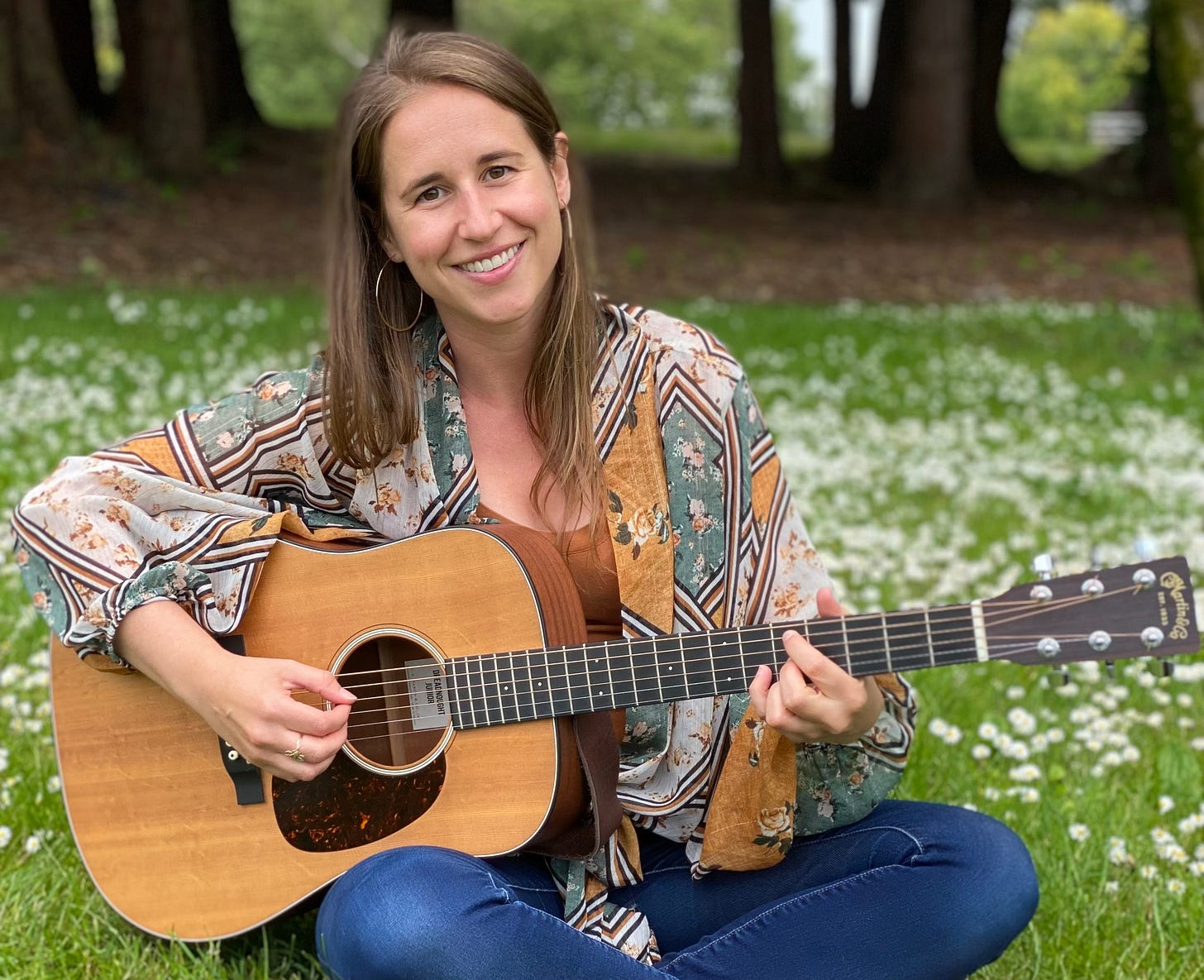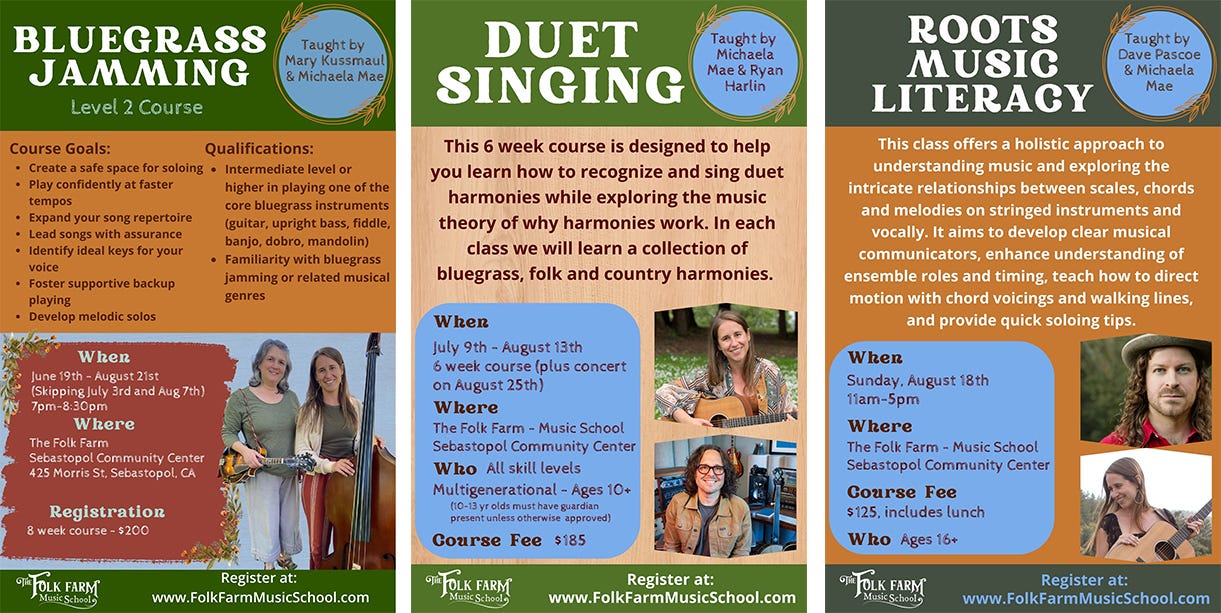Q&A with Folk Farm School founder Michaela Mae
A new folk music school sets up shop at the Sebastopol Community Cultural Center
A couple of weeks ago, the Folk Farm School held their first class in the Sebastopol Community Cultural Center. The school has a dedicated room filled with instruments, including a cello, a piano and guitars, and will be offering several other workshops for all skill levels in the coming months and years.
Sebastopol Times caught up with the school’s founder, Michaela Mae, to learn a little bit about both her background and how the school came about. Flyers for the school’s upcoming classes—along with a video of a jam circle—are at the bottom of this article.
How did you become a teacher?
I started teaching in general when I was in the Peace Corps in Senegal. I was teaching in my second language, which, like nobody’s second language, is super great, and so I had to get really creative with how I taught. I was also in a West African dance troop. and I got exposed to the music there.
Largely I felt like I was invited into a community, and I felt like for the first time in my life the fulfillment that comes from community connection, and was like, ‘Oh, this is this is really missing in my own culture.’ I’ve been playing music since I was seven, but I hadn’t felt that community aspect the same way that I did when I was in Senegal.
What is the difference between going to a workshop/class and a jam?
So I started going to bluegrass jams when I came back here from Africa. There’s a jam in Sonoma County probably once a day or night, so there’s lots of opportunities to play music with other people. A lot of the jams here are open to all levels, so you’ll have total beginners and then you’ll have really advanced people, and they can all sit in the same circle, which I love. But you don’t get the chance to workshop songs. If I’m with other people, and we’re workshopping something, I can play for seven hours easy. It just goes by like that.
I know a lot about music theory so I like to teach music theory in these spaces. I know a lot about vocal techniques so I like to empower people to understand how to use their voice in a powerful way.
I recall being a part of a folk circle when I was a kid. As a tone-deaf hyperactive fifth grader, I had a hard time taking any of it seriously, but I recall it being very lively and fun. Is that how jams you are a part of go? How does a jam work?
There is totally this bubbly adrenaline thing when you’re playing music together, and there’s something else that’s interesting too, which is that you’re risking being heard. That can be pretty vulnerable for people.
So how a jam works is, okay, let’s say we have seven people. One person leads a song, they sing all the verses and then we can all sing the chorus together, and then they pass around a solo. So someone gets on their guitar and is like, okay, here I go, ‘Doo doo doo doo doo doo doo doo…’ and that is pretty scary for everybody. But you could talk to the best soloists that you know and they would be scared like that. Every time I do a solo, it’s like diving into the deep end. There is that element of fear. I’m like, ‘Oh, God,’ and then it’s over and you’re like, ‘I did it and I didn’t die.’ One of my students recently said that the only way to get better is to let yourself be heard. I’m a really firm believer in that, and I think that’s now a mantra of mine.
Are more experienced players ever annoyed when they have to be in circles with beginners?
Not really, and that’s why I like roots music. A lot of the songs are three or four chords, so if you’re brand new to guitar, you can learn three chords in like a day, right? So people who are brand new to music can sit in the same circle as people who have been playing for 25 years because all the songs are pretty simple. The person who has been playing for 25 years will play with more finesse and more driving rhythm, and their solos will be better, but I love that they can sit beside the beginner. I think we all started there—like all of us started at the beginning—and we remember what it was like. So if someone’s out of tune, it’s such a helpful crew that someone says, ‘Hey, I think you might need to tune your instrument. Do you want to borrow my tuner?’ I have found that everyone’s pretty helpful and supportive. That fear of like, ‘You’re a beginner. You can’t sit with us!’ is not present in this community.
How did the Folk Farm School come to be established?
I’ve been teaching at different music schools in the area for two years, and I felt really inspired and excited by the folk schools that are in the United States. I wanted to go to all their classes and concerts, but they’re really far, and so I was like, ‘Man, I’d really like something where I live to go.’ I started looking at rental spaces and I was kind of just like dreaming, right? It was a 10-year plan is what I thought. This was like four months ago. I found a place in downtown Petaluma, and it fell through. So I kept looking, and I reached out to the community center who has had this music space that’s just been a storage unit for years. I was like, ‘What if I reached out to them and asked?’ and I did and they ran it by the community and they were like, ‘We love this idea.’
I believe in community centers, and I believe in community spaces, and so I feel like really good that it’s in here, you know, in my hometown’s community center. So yeah, I kind of thought like, ‘Why not me? Why don’t I create this thing that I want in my own community?’ So I guess that’s what happened.
Why is music important to do with other people?
I’ve been playing music for 25 years. I have found that when I play alone, I don’t feel the same fulfillment. So like, after I finish, if it’s just me after a gig, I don’t really have anyone to celebrate with I’m not like, ‘We did it!’ It’s like, okay, ‘I did it.’ The end, right. Good job me. But if I’m playing with a band of three or six people, at the end it’s like, ‘Wow, good job on that song. Great. That sounded really good. Oh, man, I loved your baseline on this. Your rhythm on this song was so good. Your voice sounded really nice here.’ And then all of their friends come to our performances with all of my friends and family. I personally think that the reason why people do music is to play with others.
Find out more about the Folk Farm School.



